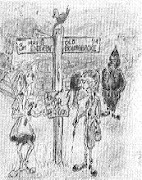BBC's Today Programme has been inviting votes to choose an Act of Parliament which is particularly unpopular and which most people would like to see repealed. The plan is to find a tame MP to take up the cause of the winning (= losing) law and make a forlorn (I'm sure) attempt abolish it.
The shortlist of six are pretty fundamental to national sovereignty, the constitution and individual freedom.
If The European Communities Act (1972) is chosen, and I hope it is, there's not a cat in hell's chance of it being repealed. The Establishment are fully behind the European Union (how I hate that phrase) for all kinds of sentimental, political, economic and plain selfish reasons. I can understand Luxembourg liking it. How else could a prime minister with roughly the same power as the chief executive of a British county council get to sit at the top tables of Europe?
But Britain? Great Britain? Discarding a millennium of inheritance for a mess of potage. Gradually divesting itself of hard-won national freedom and submitting tamely to the dictates of foreign bureaucrats.
If we must abandon national sovereignty, let's become the 51st state of America. At least they speak English.
The Human Rights Act (1998). How can anyone be against human rights? Not me, there are two problems with this Act:
It seems that every conceivable 'right' has been included, almost as if they were jotted down on a flip-chart in a seminar on the subject, not subjected to any test of practicality and imposed from outside. That's why we have the 'right' of murderers to vote in elections, or of convicted terrorists no to be deported.
Moreover, it means that our own supreme court, the House of Lords or its successor, can be overruled. Technically, that means that our Head of State, the Queen, is no longer being sovereign, and neither is our Parliament.
The Act of Settlement (1701) follows on naturally from my mention of the Queen. Now, I'm no royalist, but I am a monarchist, at least in British terms. In my estimation, Britain is a republic, but happens to have an hereditary president. If we had a republic on the German model, we'd have a toothless politician as head of state; if the American model, we'd have a totally different constitution, not that that's not worth considering, in view of overwheening prime ministerial power her.
Basically, our monarchy works constitutionally and, emotionally, I like the link it provides with the past. (I'm obviously no radical).
But the Act of Settlement excludes Roman Catholics from the throne, as well, if I'm not mistaken, as other non-communicants with the Church of England. I think the implication of this would be the disestablishment of the Church of England, no bad thing, but bang goes all that tradition by which I set so much store. So be it. And while we're about, let's abolish the primacy of male children in the succession. It won't make any difference for 50 years anyway.
Next is The Serious Organised Crime Act (2005), with particular reference to the banning of demonstrations within a certain radius of Parliament. I don't know about the act as a whole, but I have to say I have no worries about keeping demos away from Parliament. At best, they can disrupt the work of MPs, at worst they can intimidate. After all, we don't want to be like the French National Assembly after 1789, with the mob howling outside.
The arrest of that woman reading out the names of soldiers killed in Iraq was obviously foolish and lacked common sense. So maybe an amendment is required, but libertarian as I am, I can't see an erosion on free speech here. There's plenty of erosion going on elsewhere.
The Dangerous Dogs Act (1991) is one of those silly laws brought in on a wave of press hysteria
about some very nasty injuries inflicted on children by pit bull terriers. The government had to be seen to be doing something about it, and this was it. It was the same sort of thing with the law banning handguns - a lot of inconvenience for innocent citizens because of one or two irresponsible or criminal people.
As for The Hunting Act (2004), it is hardly worth repealing because it's impossible to enforce, and when normally law-abiding people start finding ways round an unpopular and intrusive law. I don't hunt, never have, don't want to; but I see no reason why those who enjoy it should not indulge. It's another area where Parliament should mind it's own bloody business.
I've voted to choose the EC act, but I would happily see the back of 5 of these laws. Sometimes I think we should abolish all laws and start again.

No comments:
Post a Comment